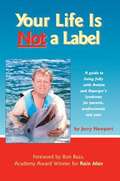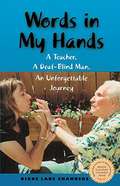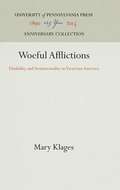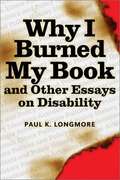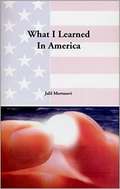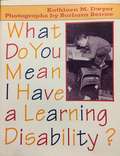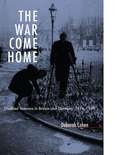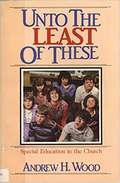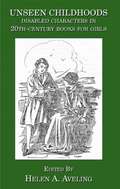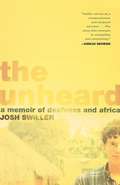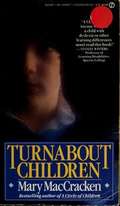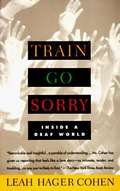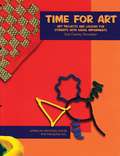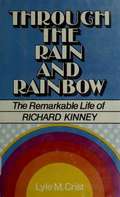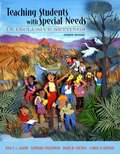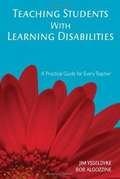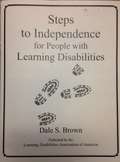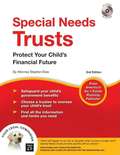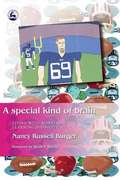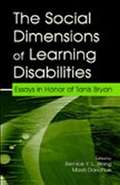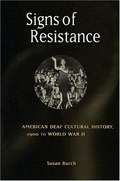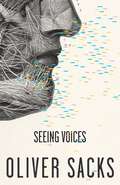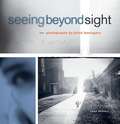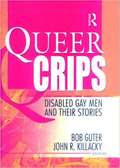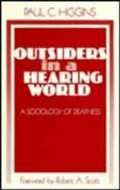Special Collections
Disability Collection
Description: Bookshare is pleased to offer a collection focused on the topic of disability and accessibility. #disability
- Table View
- List View
Your Life is Not A Label
by Jerry NewportThis book describes Jerry's life and how he dealt with the challenges of Asperger syndrome. It also lets you, the reader know of things you should and shouldn't do, as well as Jerry's mistakes.
Words in My Hands
by Diane ChambersBert Riedel, an 86-year-old deaf-blind pianist, cut off from the world since age 45, discovers a new life through hand-over-hand sign, taught to him by the author.
Woeful Afflictions
by Mary KlagesFrom Tiny Tim to Helen Keller, disabled people in the nineteenth century were portrayed in sentimental terms, as afflicted beings whose sufferings afforded able-bodied people opportunities to practice empathy and compassion. In all kinds of representations of disability, from popular fiction to the reports of institutions established for the education and rehabilitation of disabled people, the equation of disability and sentimentality served a variety of social functions, from ensuring the continued existence of a sympathetic sensibility in a hard-hearted, market-driven world, to asserting the selfhood and equality of disabled adults. Unique in its focus on blindness and its examination of the interplay between institutional discourse and popular literature, Woeful Afflictions offers a detailed historical analysis of the types of cultural work performed by sentimental representations of disability in public reports and lectures, exhibitions, novels, stories, poems, autobiographical writings, and popular media portrayals from the 1830s through the 1890s in the United States. Woeful Afflictions combines contemporary scholarship on sentimentalism with the most recent works on the cultural meanings of disability to argue that sentimentalism, with its emphasis on creating emotional identifications between texts and readers, both reinforces existing associations between disability and otherness and works to rewrite those associations in portraying disabled people, in their emotional capacities, as no different from the able-bodied. This book will interest anyone concerned with disability studies and the social construction of the body, with the history of education and of public institutional care in the United States, and with autobiographical writings.
Why I Burned My Book And Other Essays On Disability
by Paul K. LongmoreThis wide-ranging book shows why Paul Longmore is one of the most respected figures in disability studies today. Understanding disability as a major variety of human experience, he urges us to establish it as a category of social, political, and historical analysis in much the same way that race, gender, and class already have been. The essays here search for the often hidden pattern of systemic prejudice and probe into the institutionalized discrimination that affects the one in five Americans with disabilities.
Whether writing about the social critic Randolph Bourne, contemporary political activists, or media representations of people with disabilities, Longmore demonstrates that the search for heroes is a key part of the continuing struggle of disabled people to gain a voice and to shape their destinies. His essays on bioethics and public policy examine the conflict of agendas between disability rights activists and non-disabled policy makers, healthcare professionals, euthanasia advocates, and corporate medical bureaucracies.
The title essay, which concludes the book, demonstrates the necessity of activism for any disabled person who wants access to the American dream.
Author note: Paul K. Longmore is Professor of History at San Francisco State University. He is the author of The Invention of George Washington and the co-editor (with Lauri Umansky) of The New Disability History: American Perspectives.
What I Learned in America
by Jalil MortazaviAMERICA, THE LAND OF OPPORTUNITY EVEN FOR A BLIND JOURNALIST FROM IRAN Throughout the world, millions of people believe if you are blind that this prevents you from traveling too far from home. Others, of course, may have these same beliefs but have just kept them to themselves. Thus begins Jalil Mortazavi's engaging and baffling experience as he tries to overcome such odd thinking. In his book, he tries to cover much of what he has learned in the hope that it will inspire, delight, and amuse his audience. Mortazavi is an Iranian-American journalist who lives in Brookline, Massachusetts. He works for the Persian-American Media Watch. He has also been associated with Persian Voice of Boston, 24-Hour Persian Radio based in California, and 24-Hour Persian TV [NI TV]. He has appeared on Imus in the Morning, and he has done some news commentary on National Public Radio's All Things Considered and on Talk of the Nation. In addition, Jalil enjoyed being a guest on a number of different television and radio talk shows WCV TV, American Radio Network in Baltimore, and radio stations WBZ, WHDH, WRKO, WROR, and WTTP. Mortazavi has also written for such publications as The Boston Globe, The Boston Herald, and The Brockton Enterprise.
What Do You Mean I Have a Learning Disability?
by Kathleen M. DwyerTen-year-old Jimmy just accepts the fact that other kids can do things better than he can. It's always been that way--but now Jimmy is starting to think there must be a reason. One day he whispers to his cat, "I'm so stupid. I know I am." This true story has a happy ending. One of Jimmy's teachers encouraged his parents to have Jimmy tested, and it turned out that he had a learning disability. Hard work and perseverance, and the support of his family, helped Jimmy overcome his disability. For children who are learning disabled, and for their families and friends, this inspiring book offers encouragement and support in a shared effort.
The War Come Home
by Deborah Cohen"This impressive book offers a powerful set of insights into the lasting effects of the First World War and the different ways in which belligerent states came to terms with the war's consequences."
Unto the Least of These
by Laverne Webber and Ellen Glanville and Andrew WoodDescribes how to develop a ministry for the mentally retarded. Includes teaching strategies, discipline information, and other useful information.
Unseen Childhoods
by Helen A. AvelingThe nine essays in this collection break the 20th century into three periods - early, middle, and late. They cover the themes of stereotypes, role models, and inclusion and segregation, tracing their evolution across nearly a hundred years. Among the essays are "Modeling Illness in the Early 20th Century" by Helen A. Aveling; "A Choice of Virtues," by Deborah Kent; and "My Sibling the Other," by Rebecca R. Butler.
The Unheard
by Josh SwillerSwiller spent his early years in frustrated limbo on the sidelines of the hearing world. So he decided to abandon the well-trodden path after college, setting out to find a place so far removed that his deafness would become irrelevant.
Turnabout Children
by Mary MaccrackenAfter receiving her masters degree in special education, the author decides to go into private practice as a learning-disabilities specialist. In this book, she tells of five of the children she worked with, and the techniques she used to help each child overcome his or her unique set of difficulties.
Train Go Sorry
by Leah Hager CohenThis portrait of New York's Lexington School for the Deaf is not just a work of journalism. It is also a memoir, since Leah Hager Cohen grew up on the school's campus and her father is its superintendent. As a hearing person raised among the deaf, Cohen appreciates both the intimate textures of that silent world and the gulf that separates it from our own.
Time For Art
by Gail Cawley ShowalterThis simple manual gives some helpful suggestions for people who want to teach art to children who are blind or visually impaired. It also gives some suggestions on projects that the students can do. It is not intended as the "all around authority" on the topic but serves as a spring board into other projects and ideas. Topics and projects include, fake fossils, aluminum repousse, papier mache bowls, wire sculptures, and raised line drawings. Good book for anyone interested in ways to adapt lessons in art for learners with special needs. Also includes art projects which relate to science.
Through the Rain and Rainbow
by Lyle M. CristRichard Kenny lost his sight at age seven. He spent his childhood adjusting to and overcoming blindness. He entered college but had to drop out in his second year when his hearing failed.
The next ten years contained motes of both great anguish and sweet victory as he adjusted to being totally deaf-blind. With perseverance, the support of family and friends, and the counsel of such leaders as Helen Keller and other workers for the deaf and blind, Kenny became the third deaf-blind person in history to earn a college degree. He married, became a father, traveled and wrote.
Teaching Students with Special Needs
by Tom E. C. Smith and Edward A. Polloway and James R. Patton and Carol A. Dowdythe one thing that will remain constant is the commitment to provide all students, regardless of their abilities or disabilities, with an equal opportunity to receive an appropriate education.
Teaching Students with Learning Disabilities
by Bob Algozzine and James E. YsseldykeThe characteristics associated with LD, and practical teaching strategies proven to increase the success rate of students both inside and outside the classroom.
Steps to Independence for People with Learning Disabilities
by Dale S. BrownThe booklet is designed to help learning disabled (LD) adults become economically independent and fulfill their potential. Introductory chapters define LD and specify such types of LD as auditory perceptual problems, catastrophic responses, directional problems, disinhibition, perceptual problems, and short term memory problems. Psychological effects of never being diagnosed are noted as well as potential dangers of being labeled. Suggestions for securing a professional diagnosis and for diagnosing one's self are given. Parents are encouraged to find practical solutions to family life problems and to teach independent living skills. Vocational aspects are examined, including searching for a job, choosing the right one, and being proud of one's job. Ideas are listed for analyzing strengths and weaknesses to overcome one's own handicap. The importance of social skills training is stressed. Practical coping strategies for dealing with perceptual problems (visual perception, dyslexia, and auditory perception) and central nervous system disorganization (directionality, hyperactivity, disinhibition, catastrophic response, and perseveration) are addressed. A final chapter lists sources of further information, professional help, and self help groups.
Special Needs Trusts
by Stephen EliasIf you care for a child or other loved one with a disability, you've no doubt thought about what will happen when you're no longer able to give that care. Fortunately, there's a simple solution to this dilemma -- create a "special needs trust." Special Needs Trusts shows you how to leave any amount of money to your disabled loved one, without jeopardizing government benefits. It provides plain-English information and forms that let you create a special needs trust by modifying your will or living trust document.
A Special Kind Of Brain
by Nancy Russell BurgerSharing the experience of bringing up a child with nonverbal learning disability (NLD), this warm and accessible book offers advice on subjects ranging across diagnosis and therapy, children's interaction with each other, suitable activities for a child with NLD and how to discuss NLD with children. An essential guide, this book will reassure, advise and inform parents and professionals who work with children with NLD.
The Social Dimensions of Learning Disabilities
by Mavis Donahue and Bernice Y. L. WongEssays discussiing the social aspects of Learning Disabilities
Signs of Resistance
by Paul K. Longmore and Lauri Umansky and Susan BurchDuring the early nineteenth century, American schools for deaf education regarded sign language as the "natural language" of deaf people, using it as the principal mode of instruction and communication. These schools inadvertently became the seedbeds of an emerging Deaf community and culture. But by mid-century, an oralist movement developed that sought to suppress sign language, removing Deaf teachers and requiring deaf people to learn speech and lip reading. Historians have all assumed that in the early decades of the twentieth century oralism triumphed overwhelmingly.
Susan Burch shows us that everyone has it wrong; Deaf students, teachers, and staff consistently and creatively subverted oralist policies and goals within the schools. Ultimately, the efforts to assimilate Deaf people resulted in fortifying their ties to a separate Deaf cultural community.
In Signs of Resistance, Susan Burch persuasively reinterprets early twentieth century Deaf history. Using community sources such as Deaf newspapers, memoirs, films, and oral (sign language) interviews, Burch shows how the Deaf community mobilized to defend sign language, increased its political activism, and clarified its cultural values. In the process, a collective Deaf consciousness, identity, and political organization were formed.
Seeing Voices
by Oliver SacksSign language is, in the hands of its masters, a most beautiful and expressive language.
Seeing Beyond Sight
by Tony DeifellFor five years Tony Deifell taught teenagers to take photographs. His students were blind. Unusual as the idea may seem at first, putting cameras in the hands of visually impaired children proved to be extremely fruitful both for the photographers, who found an astonishing new means of self-expression, and for the viewers of their images, for whom this is an entirely new kind of dreamlike and intuitive creation. Even before you know that these pictures were taken by blind teenagers, they are striking in their use of light and composition, and haunting in their chiaroscuro intensity. To learn more, visit http://www.seeingbeyondsight.org/
Queer Crips
by John R. Killacky and Bob Guterthis is an anthology of essays and short stories about gay men who are also disabled. Many of the stories and essays are taken from Bent, an on-line publication that gives voice to the often silent voices of disabled gay men.
Outsiders in a Hearing World
by Paul C. HigginsSociological observations on several topics in the deaf community: identity, deviance among the deaf, stigma, and encounters with the hearing.
